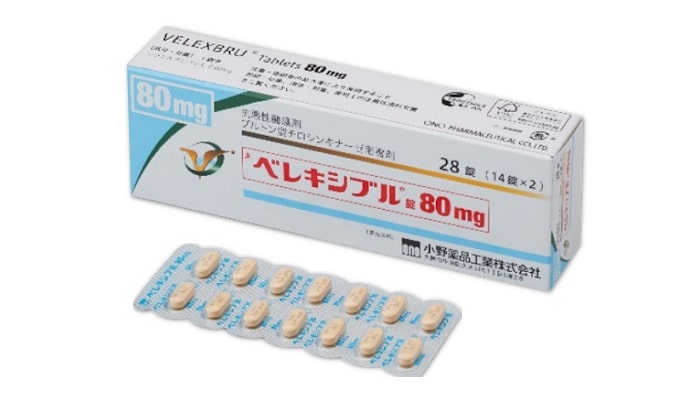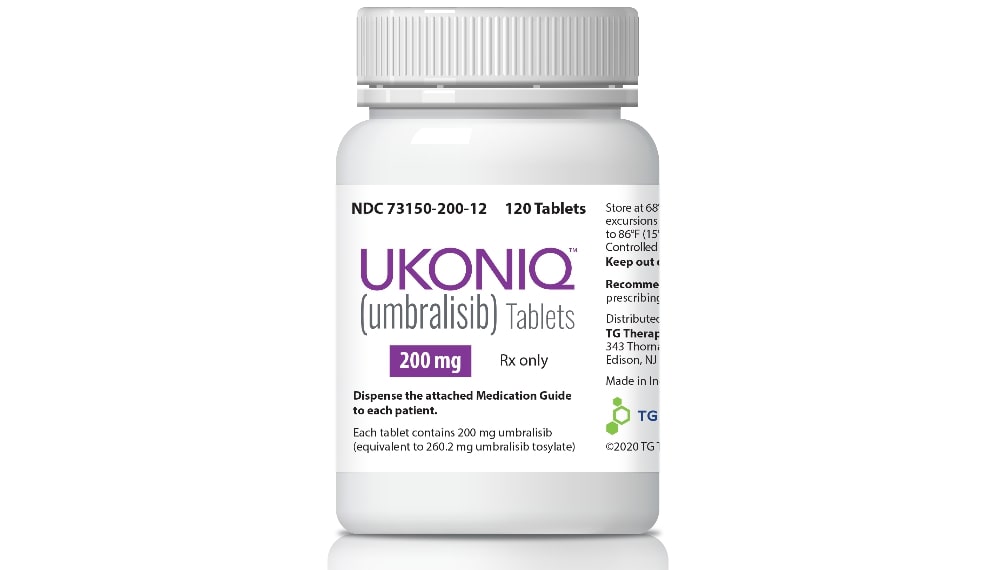Velexbru (tirabrutinib hydrochloride) vs Ukoniq (umbralisib)
Velexbru (tirabrutinib hydrochloride) vs Ukoniq (umbralisib)
Velexbru (tirabrutinib hydrochloride) and Ukoniq (umbralisib) are both targeted therapies used to treat certain types of blood cancers, but they work in different ways and are approved for different indications. Velexbru is a Bruton's tyrosine kinase (BTK) inhibitor indicated for the treatment of conditions such as mantle cell lymphoma in patients who have received at least one prior therapy, while Ukoniq is a dual inhibitor of PI3K-delta and CK1-epsilon, approved for the treatment of marginal zone lymphoma and follicular lymphoma after at least one prior anti-CD20-based regimen. When deciding between these medications, it is crucial to consult with a healthcare professional to consider the specific type of cancer, previous treatments, potential side effects, and the overall health profile of the patient.
Difference between Velexbru and Ukoniq
| Metric | Velexbru (tirabrutinib hydrochloride) | Ukoniq (umbralisib) |
|---|---|---|
| Generic name | Tirabrutinib | Umbralisib |
| Indications | Approved in Japan for the treatment of recurrent or refractory primary central nervous system lymphoma | Approved for the treatment of marginal zone lymphoma (MZL) and follicular lymphoma (FL) |
| Mechanism of action | Bruton's tyrosine kinase (BTK) inhibitor | PI3K delta and CK1 epsilon inhibitor |
| Brand names | Velexbru | Ukoniq |
| Administrative route | Oral | Oral |
| Side effects | Neutropenia, thrombocytopenia, rash, infections, anemia, etc. | Increased risk of infections, diarrhea, fatigue, nausea, etc. |
| Contraindications | Known hypersensitivity to tirabrutinib or any component of the formulation | Known hypersensitivity to umbralisib or any component of the formulation |
| Drug class | BTK inhibitor | PI3K inhibitor |
| Manufacturer | Ono Pharmaceutical Co., Ltd. | TG Therapeutics, Inc. |
Efficacy
Velexbru (Tirabrutinib Hydrochloride) Efficacy in Lymphoma
Velexbru, known by its generic name tirabrutinib hydrochloride, is a Bruton's tyrosine kinase (BTK) inhibitor that has shown efficacy in the treatment of certain types of lymphoma. Specifically, tirabrutinib has demonstrated promising results in clinical trials for patients with mantle cell lymphoma (MCL) and other B-cell malignancies. In clinical studies, tirabrutinib has been associated with high response rates in relapsed or refractory MCL, which is a particularly aggressive form of non-Hodgkin lymphoma. The drug works by inhibiting the BTK enzyme, which plays a crucial role in the proliferation and survival of malignant B-cells.
While the exact response rates and duration of response can vary based on the study and patient population, tirabrutinib has been reported to induce partial and complete responses in a significant proportion of treated patients. The efficacy of tirabrutinib in lymphoma is continually being evaluated in ongoing clinical trials and expanded access programs, which aim to provide more comprehensive data on its long-term benefits and optimal use in lymphoma treatment.
Ukoniq (Umbralisib) Efficacy in Lymphoma
Ukoniq, with the active ingredient umbralisib, is a novel medication that has been approved for the treatment of certain types of lymphoma, including marginal zone lymphoma (MZL) and follicular lymphoma (FL). Umbralisib is a dual inhibitor of phosphoinositide 3-kinase (PI3K) delta and casein kinase-1 epsilon (CK1ε), which are enzymes involved in the signaling pathways that contribute to the growth and survival of cancer cells. By targeting these pathways, umbralisib can help to slow down or stop the progression of the disease.
In clinical trials, umbralisib has shown to be effective in inducing responses in patients with relapsed or refractory MZL and FL after at least one prior anti-CD20-based therapy. The response rates observed in these studies indicate that umbralisib can lead to durable remissions in a subset of patients. However, the response to treatment with umbralisib can be variable, and some patients may experience better outcomes than others. Ongoing research is focused on identifying which patients are most likely to benefit from umbralisib and determining the best ways to integrate it into the broader treatment landscape for lymphoma.
Both Velexbru and Ukoniq represent important advancements in the targeted therapy approach to lymphoma treatment. Their efficacy in improving patient outcomes highlights the potential of personalized medicine in oncology, where treatments can be tailored to the specific genetic and molecular characteristics of a patient's cancer. As with all medications, the efficacy of these drugs must be weighed against their safety profiles, and the decision to use them should be made in consultation with a healthcare professional.
Regulatory Agency Approvals
Velexbru
-
Pharmaceuticals and Medical Devices Agency (PMDA), Japan

Ukoniq
-
Food and Drug Administration (FDA), USA

Access Velexbru or Ukoniq today
If Velexbru or Ukoniq are not approved or available in your country (e.g. due to supply issues), you can access them via Everyone.org.
How it works

Make an enquiry
Choose the medicine you want to buy, answer a couple of questions, and upload your prescription to speed things up. We’ll get back to you within 24 hours.


Make an enquiry
Choose the medicine you want to buy, answer a couple of questions, and upload your prescription to speed things up. We’ll get back to you within 24 hours.


Breeze through the paperwork
We'll guide you through the required documents for importing unapproved medicine, ensuring you have all the necessary information.


Get a personalized quote
We’ll prepare a quote for you, including medicine costs and any shipping, administrative, or import fees that may apply.


Receive your medicine
Accept the quote and we’ll handle the rest - sourcing and safely delivering your medicine.

Some text on this page has been automatically generated. Speak to your physician before you start a new treatment or medication.
Let's talk
If you have any questions, call us or send us a message through WhatsApp or email:
Contact us




